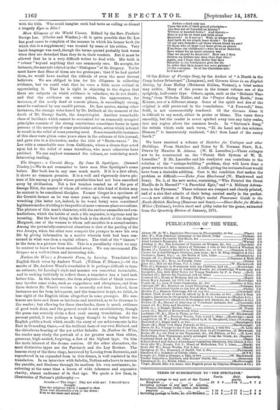has good cause to complain of the manner in which
his former book (to which this is a supplement) was treated by some of his critics. Very harsh language was used, though the terms quoted probably look worse when they are detached than they do in their context. But it must be allowed that he is a very difficult writer to deal with. His faith is " robust " beyond anything that one commonly sees. Ho accepts, for instance, the marvels related in the " Dialogues" of St. Gregory. Yet he must know that ame of them are too grotesque ; that if he had quoted them, he would have excited the ridicule of even the most fervent believers. We are obliged to him for his diligence in collecting evidence, but we could wish that he were a little more critical in appreciating it. That ho is right in objecting to the dogma that there are subjects on which evidence is valueless, we do not doubt ; and that the evidence on some points, the appearances, for instance, of the newly dead at remote places, is exceedingly strong, must be confessed by any candid person. Dr. Lee quotes, among other instances, the strange voice heard by Dr. Delitsch at the moment of the death of Mr. George Smith, the Assyriologist. Another remarkable class of incidents which cannot be accounted for on commonly accepted principles consists of the strong convictions sometimes borne in upon persons of the necessity of some particular action, action which is found to result in the relief of some pressing need. Some remarkable instances of this class were given somo years since in the columns of this journal, and gave rise to a discussion, under the title of "Brain-waves." Dr.
Lee adds a remarkable case from California, where a dream thus acted upon led to the relief of some travellers, who must otherwise have perished. We can anyhow commend the volume, as containing much interesting reading.






























 Previous page
Previous page